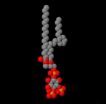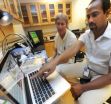The role of genes in political behavior
2012-08-27
(Press-News.org) Politics and genetics have traditionally been considered non-overlapping fields, but over the past decade it has become clear that genes can influence political behavior, according to a review published online August 27th in Trends in Genetics. This paradigm shift has led to novel insights into why people vary in their political preferences and could have important implications for public policy.
"We're seeing an awakening in the social sciences, and the wall that divided politics and genetics is really starting to fall apart," says review author Peter Hatemi of the University of Sydney. "This is a big advance, because the two fields could inform each other to answer some very complex questions about individual differences in political views."
In the past, social scientists had assumed that political preferences were shaped by social learning and environmental factors, but recent studies suggest that genes also strongly influence political traits. Twin studies show that genes have some influence on why people differ on political issues such as the death penalty, unemployment and abortion. Because this field of research is relatively new, only a handful of genes have been implicated in political ideology and partisanship, voter turnout, and political violence.
Future research, including gene-expression and sequencing studies, may lead to deeper insights into genetic influences on political views and have a greater impact on public policy. "Making the public aware of how their mind works and affects their political behavior is critically important," Hatemi says. "This has real implications for the reduction of discrimination, foreign policy, public health, attitude change and many other political issues."
###
Hatemi et al.: "The Genetics of Politics: Discovery, Challenges and Progress."
END
ELSE PRESS RELEASES FROM THIS DATE:
2012-08-27
Recent evidence and new treatments for colonic diverticulitis that may help clinicians manage and treat the disease are summarized in a review in CMAJ (Canadian Medical Association Journal).
Diverticular disease, in which sac-like protrusions form in the wall of the colon, is common in developed countries, although it is increasing throughout the world, likely because of lifestyle changes. In people with the disease, about 25% will develop symptoms, which include abdominal pain and changed bowel habits, often leading to a diagnosis of irritable bowel syndrome. The widespread ...
2012-08-27
CORVALLIS, Ore. – A new study suggests that nicotinamide, more commonly known as vitamin B3, may be able to combat some of the antibiotic-resistance staph infections that are increasingly common around the world, have killed thousands and can pose a significant threat to public health.
The research found that high doses of this vitamin increased by 1,000 times the ability of immune cells to kill staph bacteria. The work was done both in laboratory animals and with human blood.
The findings were published today in the Journal of Clinical Investigation by researchers ...
2012-08-27
A recent study in the Journal of General Physiology brings new insights to an area of ion channel regulation: whether voltage-gated potassium (Kv) channels can be regulated by physiological changes to PIP2.
Potassium channels, microscopic pores that allow potassium ions to cross cell membranes, are crucial to such diverse processes as conduction of the nerve impulse, regulation of the heartbeat, and the secretion of hormones such as insulin. PIP2, a minor phospholipid component of cell membranes, regulates the activity of various proteins in the cell membrane, and ...
2012-08-27
AUGUSTA, Ga. – Successive, vigorous bouts of leg compressions following a stroke appear to trigger natural protective mechanisms that reduce damage, researchers report.
Compressing then releasing the leg for several five-minute intervals used in conjunction with the clot-buster tPA, essentially doubles efficacy, said Dr. David Hess, a stroke specialist who chairs the Medical College of Georgia Department of Neurology at Georgia Health Sciences University.
"This is potentially a very cheap, usable and safe – other than the temporary discomfort – therapy for stroke," ...
2012-08-27
Munich, Germany – August 27 2012: Renal denervation improves blood pressure and arterial stiffness in patients with therapy resistant hypertension, according to research presented at ESC Congress 2012 by Mr Klaas Franzen from the University Hospital of Schleswig-Holstein. The findings suggest that renal denervation regenerates blood vessels and could reduce cardiovascular events.
Malignant arterial hypertension was historically treated with surgical thoracolumbar splanchnicectomy, a type of sympathectomy treatment that was introduced in 1938. "A significant reduction ...
2012-08-27
DURHAM, N.C. – The benefits of breast milk have long been appreciated, but now scientists at Duke University Medical Center have described a unique property that makes mother's milk better than infant formula in protecting infants from infections and illnesses.
The finding, published in the August issue of the journal Current Nutrition & Food Science, explains how breast milk, but not infant formula, fosters colonies of microbiotic flora in a newborn's intestinal tract that aid nutrient absorption and immune system development.
"This study is the first we know of that ...
2012-08-27
Munich, Germany – August 27 2012: Renal denervation leads to significant and sustained blood pressure reduction for up to 18 months in patients with treatment resistant hypertension, according to research presented at ESC Congress 2012. The new clinical data from the Symplicity HTN-2 randomized clinical trial were presented by principal investigator Dr Murray Esler at the scientific session, associate director of the Baker IDI Heart and Diabetes Institute of Melbourne, Australia and by Prof Böhm for the ESC Press Conference.
Treatment resistant hypertension is blood pressure ...
2012-08-27
Munich, Germany – August 26 2012: Renal sympathetic denervation improves anxiety, depression, quality of life and stress in patients with resistant hypertension, according to research presented at ESC Congress 2012 by Dr Denise Fischer from Saarland University Hospital.
Arterial hypertension is often associated with several psychological comorbidities, such as anxiety and panic disorders, leading to impaired quality of life. Catheter-based renal sympathetic denervation (RDN) is a novel treatment option for patients with resistant hypertension and has been shown to reduce ...
2012-08-27
Munich, Germany – August 27 2012: Renal denervation successfully treats patients with resistant hypertension in real world patient populations, according to a study presented at ESC Congress 2012. The findings were presented by Dr Darren Mylotte from France.
Transcatheter renal denervation represents a novel therapy for treating patients with treatment resistant hypertension, a condition which greatly increases the risk of myocardial infarction and stroke.
"The Symplicity Hypertension I and II studies have suggested that this procedure significantly lowers blood pressure ...
2012-08-27
August 27, 2012 -- In one of the most comprehensive peer-reviewed discussions on cancer vaccines and immunotherapeutics, a Special Focus in the journal Human Vaccines & Immunotherapeutics provides a critical view on cancer vaccines and a discussion on best approaches for the future. From firsthand accounts of principal investigators involved in numerous failed cancer vaccine programs, including Oncophage® and MVAX®, to commentary from world experts in cancer vaccine development, authors in the Special Focus recount the mistakes of the past and provide an critical lens ...
LAST 30 PRESS RELEASES:
[Press-News.org] The role of genes in political behavior

